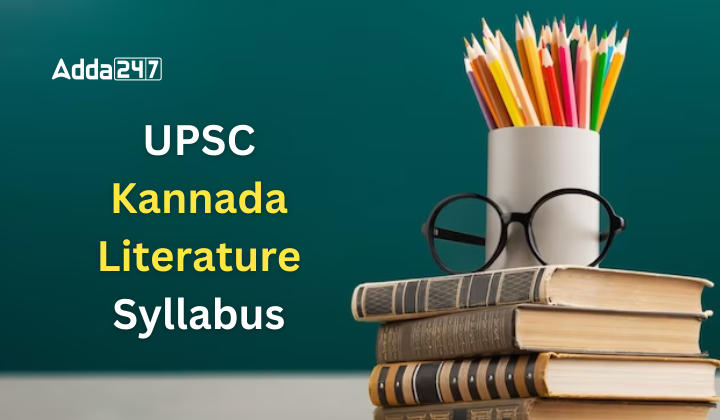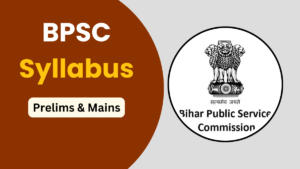Table of Contents
As part of the UPSC Civil Services examination, Kannada Literature serves as an optional subject. This language finds extensive usage in Karnataka, southern Maharashtra, and regions of Telangana, Andhra Pradesh, Tamil Nadu, and Kerala.
Being listed in the eighth schedule of the Constitution of India, Kannada holds the distinction of being one of the 22 official languages of the country. In UPSC Kannada Literature Syllabus 2025, candidates can start their preparation for the exam.
UPSC Kannada Literature Syllabus 2025 Highlights
IAS Mains aspirants must carefully examine the syllabus of Kannada Literature, which is an optional subject. Kannada boasts a profound and continuously evolving literary heritage owing to its long history. The optional subject includes two papers, Paper I and Paper II.
Those with a background in Kannada education or those who consider it their native language are encouraged to choose this subject. It is essential to note that all answers in the Civil Services Examination must be written in Kannada. The Kannada literature optional carries a total of 500 marks, distributed evenly between two papers, each worth 250 marks, in UPSC Mains.
| UPSC Kannada Literature Syllabus 2025 Highlights | |
| Name of Conducting Body | Union Public Service Commission (UPSC) |
| Mode Of Exam | paper pen (offline mode) based examination |
| Name of Exam | Kannada Literature |
| Kannada Literature Optional Subject | Paper I & II |
| Total Marks | 250 Marks for Each (Paper I & II) |
| Total Time | 3 Hours Each |
| Official Website | upsc.gov.in |
UPSC Kannada Literature Syllabus 2025
The UPSC Kannada optional subject includes two papers, Paper-I and Paper-II. Those with a background in Kannada education or those who consider it their native language are encouraged to choose this subject.
UPSC Kannada Literature Syllabus 2025 For Optional Paper I
The first paper of the UPSC Kannada Literature Syllabus covers the following topics mentioned below in the table.
| UPSC Kannada Literature Syllabus 2025 Optional Paper I (Answers must be written in Kannada) | |
| Section | Topics |
| History of Kannada Language and Literature | What is Language? General characteristics of Language. Dravidian Family of Languages and its specific features. The Antiquity of the Kannada Language. Different phases of its Development. |
| Dialects of Kannada Language: Regional and Social. Various aspects of developments of Kannada Language: phonological and Semantic changes. Language borrowing | |
| Ancient Kannada literature: Influence and Trends, Poets for study: Specified poets from Pampa to Ratnakara Varni are to be studied in the light of contents, form and expression: Pampa, Janna, Nagachandra. | |
| Medieval Kannada Literature: Influence and Trend | |
| Vachana Literature: Basavanna, Akka Mahadevi. | |
| Medieval Poets: Harihara, Raghavanka, Kumara-Vyasa. | |
| Dasa literature : Purandara and Kanaka. | |
| Sangatya : Ratnakaravarni | |
| Modern Kannada literature: Influence, trends and ideologies, Navodaya, Pragatishila, Navya, Dalita and Bandaya. | |
| Poetics and Literary Criticism and Cultural History of Karnataka | Definition and concepts of poetry; Word, Meaning, Alankara, Reeti, Rasa, Dhwani, Auchitya. |
| Interpretations of Rasa Sutra.Modern Trends of Literary Criticism: Formalist, Historical, Marxist, Feminist, Post-colonial Criticism. | |
| Contribution of Dynasties to the Culture of Karnataka: Chalukyas of Badami and Kalyani, Rashtrakutas, Hoysalas, Vijayanagara rulers, in a literary context | |
| Major religions of Karnataka and their cultural contribution. | |
| Arts of Karnataka; Sculpture, Architecture, Painting, Music, Dance—in the literary context. Unification of Karnataka and its impact on Kannada literature. | |
UPSC Kannada Literature Syllabus 2025 For Optional Paper II
The Kannada Literature Syllabus for UPSC Paper II is categorized into 2 parts. The detailed list of topics is in the table below for a detailed syllabus.
| UPSC Kannada Literature Syllabus 2025 Optional Paper II (Answers must be written in Kannada) | |
| Section | Topics |
| Part A | Old Kannada Literature:
1. Vikramarjuna Vijaya of Pampa (Cantos 12 & 13), (Mysore University Pub.) 2. Vaddaradhane (Sukumaraswamyia Kathe, Vidyutchorana Kathe) |
| Medieval Kannada Literature:
1. Vachana, Kammata, Ed. K. Marulasiddappa K.R. Nagaraj (Bangalore University Pub.) 2. Janapriya Kanakasamputa, Ed. D. Javare Gowda (Kannada and Culture Directorate, Bangalore) 3. Nambiyannana Ragale, Ed., T.N. Sreekantaiah (Ta. Vem. Smaraka Grantha Male, Mysore) 4. Kumaravyasa Bharata: Karna Parva (Mysore University) 5. Bharatesha Vaibhava Sangraha Ed Ta. Su. Shama Rao (Mysore University) |
|
| Part B | Modern Kannada Literature:
1. Poetry: Hosagannada Kavite, Ed. G.H. Nayak (Kannada Sahitya Parishat, Bangalore). 2. Novel: Bettada Jeeva—Shivarama Karanta Madhavi—Anupama Niranjana dalaala-Deva-nuru Mahadeva. 3. Short Story: Kannada Sanna Kathegalu, Ed. G.H. Nayak (Sahitya Academy, New Delhi) 4. Drama: Shudra Tapaswi—Kuvempu. Tughalak—Girish Karnad. 5. Vichara Sahitya: Devaru—A.N. Moorty Rao (Pub: D.V.K.Moorty, Mysore.) |
| Folk Literature:
1. Janapada Swaroopa—Dr. H.M. Nayak. (Ta. Vem. Smaraka Grantha Male, Mysore.) 2. Janpada Geetaanjali—Ed. D. Javare Gowda.(Pub: Sahitya Academy, New Delhi). 3. Kannada Janapada Kathegalu—Ed. J.S. Paramashiviaah (Mysore University). 4. Beedi Makkalu Beledo. Ed. Kalegowda Nagavara (Pub: Bangalore University). 5. Savirada Ogatugalu—Ed. S.G. Imrapura. |
|
UPSC Kannada Literature Exam Pattern 2025
According to the table, the exam pattern of each paper of the UPSC Kannada Literature Syllabus is assigned 250 marks, a total of 500 marks. Candidates must aim for a high score to significantly impact their overall performance in the UPSC Kannada Literature Exam. Understanding the UPSC Kannada Literature Syllabus is the initial step towards excelling in this subject.
Download PDF: UPSC Kannada Literature Syllabus 2025
Candidates who have a background in Kannada Literature during their graduation or master’s degree may find the UPSC Kannada Literature Optional Syllabus relevant. The syllabus consists of two papers, namely Paper 1 and Paper 2. The time duration for both exams is 3 Hours.
| UPSC Kannada Literature Syllabus 2025 Exam Pattern |
||
| Topic | Marks | Duration |
| UPSC Kannada Literature Optional Syllabus Paper 1 | 250 | 3 Hours |
| UPSC Kannada Literature Optional Syllabus Paper 2 | 250 | |
| Total Marks | 500 | |
How to Prepare for UPSC Kannada Literature Exam?
Preparing for the UPSC Kannada Literature Exam requires a well-planned strategy and dedicated efforts. Here are some steps and tips to help you with your preparation.
- Know the Syllabus: Familiarize yourself with the UPSC Hindi Literature syllabus. Understand the topics and sub-topics that need to be covered for both Paper 1 and Paper 2.
- Study Material: Gather the necessary study material, including textbooks, reference books, and previous year question papers. There are specific books available in the market that cater to the UPSC Hindi Literature syllabus.
- Read the Classics: Read and analyze the prominent literary works in Hindi literature. Focus on understanding the themes, characters, and literary devices used by the authors. Reading classics will enhance your understanding of the subject.
- Current Affairs: Stay updated with current events, literary trends, and developments in Hindi literature. Also, keep track of any major literary awards, authors’ contributions, and significant literary events.
- Language Proficiency: Work on improving your language proficiency in Hindi. Enhance your vocabulary, grammar, and comprehension skills. It will not only help you in Paper 2 but also in writing better answers overall.
- Previous Year Papers: Practice solving previous year question papers to get acquainted with the exam pattern, question types, and time management.
- Mock Tests: Take regular mock tests to assess your preparation and identify areas that need improvement. Mock tests will also help you manage your time effectively during the actual exam.
- Make Notes: Create concise and comprehensive notes for quick revision. Summarize important points and concepts for each topic.
- Time Management: Plan your preparation schedule wisely. Allocate sufficient time to each topic according to its weightage in the syllabus.
- Revision: Regularly revise the topics you have covered to reinforce your understanding and retain the information better.



 APSC Syllabus 2025, Download Prelims And...
APSC Syllabus 2025, Download Prelims And...
 Punjab PCS Syllabus 2025, New Prelims an...
Punjab PCS Syllabus 2025, New Prelims an...
 BPSC Syllabus 2025 and Exam Pattern For ...
BPSC Syllabus 2025 and Exam Pattern For ...




